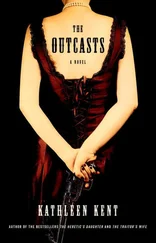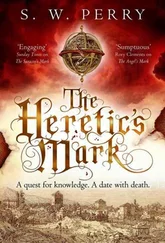A dark shadow rose up against the wall opposite and crept towards us. The shadow was figured like a woman and layered over with the thick, steaming remnants of many different cloaks stitched together. I had seen her resting motionless against the wall week after week, her glistening black face passive and indifferent to minister and prisoner alike. Her mouth opening only to eat the meager shares of bread and gruel she had been given by her master. She had been one of the first of Salem to be tried and imprisoned and had remained in chains since the bitter winds of February. The Reverend Parris, the parson of Salem, who had taken her as a slave from her home in the West Indies, had beaten her into a confession, and she walked ever after with a crooked back. Her sorcery was as frail as the body she inhabited. As frail as the Venus glass she had used to help the village girls see their fortunes.
She stepped over the prostrate bodies of the women, as though crossing a shallow stream, and came to stop at the retreating legs and arms of Hannah as she crawled backwards to escape this first, dark witch. The black eyes swept around the room and she raised her manacled wrists like an offering and said, “You want to see the Devil’s hand? The Devil’s hands is wrapped around my wrist.”
She stepped and turned and stepped and turned so that every eye could see the iron links beginning and ending the same, one to the other in a closed circle, encompassing birth and life and death. Then she dropped her hands and fixed her great, liquid eyes on me. She drew in a ragged breath and said haltingly, as though in great pain, “I am my mother’s daughter, too.” She moved away into the deep silence her words had carved and returned to her place at the wall. I never heard her say a word more. Her name was Tituba, and upon her release she would be sold again to another owner and disappear from the written deeds of men like a stone into a well.
From that moment on I was left unmolested. Apart from Tom, who tried his best to feed and protect me, there were few others in the cell who would approach me again. Save for Dr. Ames. And the sheriff’s wife.
IT IS HARD to reckon the days underground. The only remarkable change of light came at sunset when for a brief time the sun worked its way through the high slits. It had rained steadily until mid-September, and for several weeks there was no sun to differ morning from night. Then the rain dried and the nights of a sudden turned bitingly cold. When the sheriff’s wife came into our cell one morning, I knew it must have been a Friday. The evening before, a young woman of fifteen, Elizabeth Colson, had been captured and returned to jail following her indictment in May. She had fled from her home in Reading to relatives in New Hampshire but had been found by the local constables and dragged from her haven under the cover of dark. She was wearing good homespun wool, and Goody Corwin was keen to barter for the goods.
I was surprised to find that Elizabeth, hearty and well fed, was granddaughter to the old woman who had mocked the doctor from Salem, the doctor who had tried to hack off Andrew’s arm. Lydia Dustin, so the grandmother was called, was so old and so decrepit that she seemed wholly cast from a children’s tale of hags born from the bones and feathers of a crane. She put herself in front of Goodwife Corwin and said, swaying her spotted skirt back and forth, “Lay away, missus. You’ll get naught off her. But I have a fine gown you can have for a small bit of bread.” The sheriff’s wife wrinkled her nose in disgust and picked her way across the straw, followed by the old woman’s rattling laugh.
She stopped a short distance away and regarded me, her head cocked to one side as if reflecting on something many-sided. She tapped with the tip of her shoe an opening place between me and the woman sitting next to me and then squatted down, carefully pulling up her skirt from the muck. She dropped something onto my lap and said quietly, “Remember it was me who gave you this.”
She got up and left the cell, and when I looked down again I saw it was a crust of pocket bread. Hard though it was, it looked to be stuffed with meat. I quickly tucked it under my apron but not before the woman next to me saw what I had done and gave me a look that was both envious and distrusting.
Several days passed with her coming into the cell and always dropping into my lap some bit of food. I tried to share the gifts with Tom but after that first day, he refused every morsel that came from the sheriff’s table. I did not refuse. My hunger pains, which had been merely dull and aching before, came roaring viciously to life like a ratter that has tasted first blood. Tom did not begrudge me but many others did. The daily visits from the sheriff’s wife were much remarked upon and gossiped over. I could see the same looks of displeasure and condemnation that had followed me in the meetinghouse. Quietly and relentlessly I was being shunned and I welcomed it, for it was the foil against which I could pit my growing anger. The anger that was the breastplate and armor against the deep and soul-shredding guilt grinding in my chest that I had, in good part, sent my own mother to be hanged.
On Saturday, the 17th of September, the judges tried and condemned another eight women. One of the women was Abigail Dane Faulkner, and she was returned to the cell before noon with her two daughters, who had been forced to testify against her. She walked, staggering, to her place on the wall, holding her daughters against her swollen skirts, and a new terror settled in upon us, hearing that a woman so far gone with child would be committed to the hangman.
The one man who had been tried on that day, Miles Corey, refused to speak, either to give confession or to deny his guilt. He was husband to Martha Corey and was eighty years of age. When asked repeatedly to respond to the judges’ questions, he crossed his arms and, setting his jaw, looked only at the floorboards in front of him. Because he would not speak, he was tortured to induce his tongue to be loosened. On the 19th of September, a gently wind-tossed autumn day, Goodman Corey was taken from his cell out to the prison yard, where he was laid prone in the dirt. His hands and feet were staked out and heavy stones were placed on a plank laid over his body until he could no longer raise his ribs to draw in a breath. He never spoke a word to his torturers except for the two words at the very end, when he said, “More weight.”
His tongue was finally loosened in death. The crushing weight of the stones had forced it through his lifeless, protruding lips until the sheriff forced it back in again with the tip of his probing cane. The death of Miles Corey seemed to shift the winds over Salem, for Dorcas Hoar, already condemned to die on the 22nd, changed her mind and confessed that she was and had been a witch for many years. Also reprieved, in compassion for her belly, was Abigail Dane Faulkner.
IT WAS ON the fifth or sixth day of passing food to me that Goody Corwin told me the price she would exact. The morning she came in she looked distracted and out of sorts, wringing her hands upon her apron and then smoothing it down again. She approached me as usual, dropping the food into my apron, and said in a hushed tone so that no one else could hear, “My good husband tells me you may have the power of healing.”
I looked at her without understanding until she said, “Your brother. Him that was to lose his arm. The surgeon said he was sure to die. But he lived and is whole again.” She waited, and when I had nothing to answer, she continued, “I have a daughter. About your age.” She looked at the top of my head and I remembered her mea-suring me with the palm of her hand. No doubt thinking my dress would just fit her own daughter.
Читать дальше












